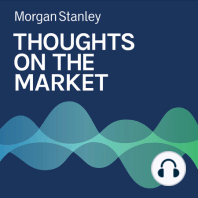3 min listen

Michael Zezas: Fiscal Policy Takes a Back Seat
Michael Zezas: Fiscal Policy Takes a Back Seat
ratings:
Length:
3 minutes
Released:
Feb 9, 2022
Format:
Podcast episode
Description
Many investors are asking when Congress will withdraw its fiscal policy support. Our answer? It already has, and 2022 could be a year where fiscal policy becomes a non-factor in the economic outlook.----- Transcript -----Welcome the Thoughts on the Market. I'm Michael Zezas as Head of Public Policy Research and Municipal Strategy for Morgan Stanley. Along with my colleagues, bringing you a variety of perspectives, I'll be talking about the intersection between U.S. public policy and financial markets. It's Wednesday, February 9th at 10 a.m. in New York.As the Fed keeps signaling its intent to withdraw its extraordinary monetary support for the economy, a common question we're hearing is when will Congress do the same with fiscal policy support? Our answer is simple: it already has.Now, we're usually getting this question from investors concerned that COVID relief aid is continuing to create inflation pressure in the economy. But the last tranche of aid was approved over a year ago, and direct aid to support households from that program have largely expired, including the child tax credit, supplemental unemployment benefits, and renter and mortgage protections.But what about all those infrastructure and social spending plans President Biden proposed? Even here there's no sizable fiscal expansion in sight. The bipartisan infrastructure framework was mostly offset by new revenues. And on the Build Back Better plan, Senator Joe Manchin appears to have made deficit neutrality a condition for his support for it. So any legislative comeback for that plan likely won't result in more fiscal support for the economy.For investors, this is a throwback to periods where fiscal policy was an afterthought. In many recent years, like 2018, 2020 and 2021, fiscal policy was a key variable to the U.S. economic outlook. This year, it looks like a non-factor. That syncs with our framework for forecasting U.S. fiscal policy outcomes, which currently points to the U.S. having moved from a phase of proactive fiscal expansion, to one of stability. That's because legislative decisions by Congress that expand the deficit are typically a function of motive and opportunity. The motive is strong when there's perceived political value to the short-term economic boost that comes with the deficit expansion. The opportunity is there when one party controls Congress and the White House. Both these conditions were met after the 2020 election, resulting in another round of substantial COVID aid. But with inflation on the rise and issue polls showing it's beginning to bother voters, that motive is waning. As a result, expect U.S. fiscal policy to remain neutral until an election or an economic downturn opens a path for it.But while fiscal policy might not be a macro factor, it could still drive some sector outcomes. For example, a deficit neutral build back better plan could still feature a corporate minimum tax, creating headwinds for financials and telecom. But it could also include substantial spending on carbon reduction, potentially directing a lot of fresh capital to the clean tech sector. And of course, it's important to remember 2022 is an election year, so expect the fiscal conversation to evolve.Thanks for listening. If you enjoy the show, please share Thoughts on the Market with a friend or colleague, or leave us a review on Apple Podcasts. It helps more people find the show.
Released:
Feb 9, 2022
Format:
Podcast episode
Titles in the series (100)
Mike Wilson: How Confident Are U.S. Businesses in the Economy? by Thoughts on the Market